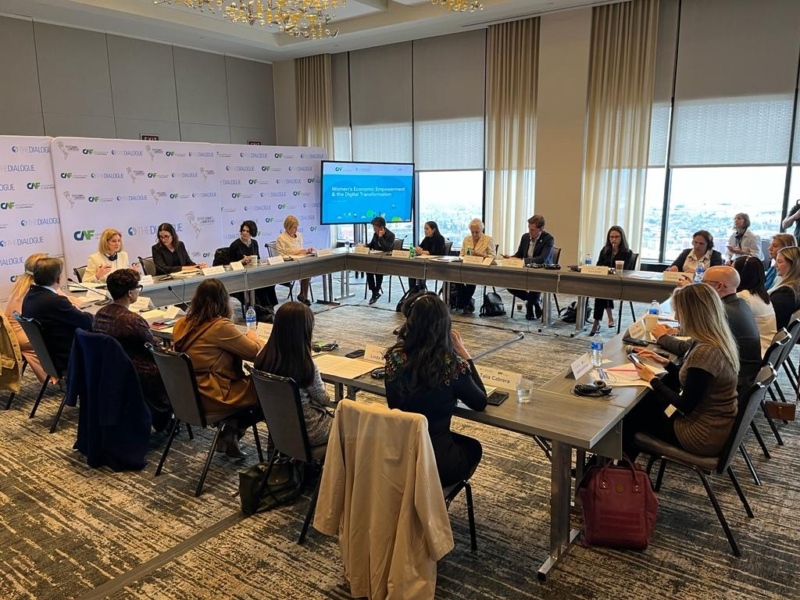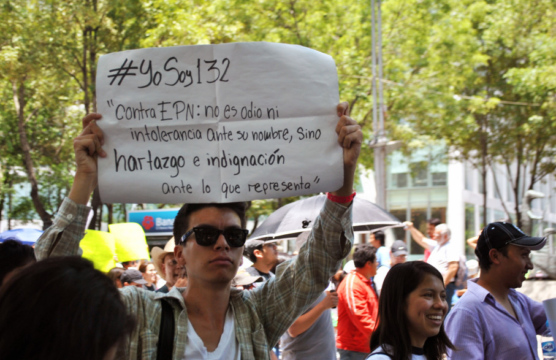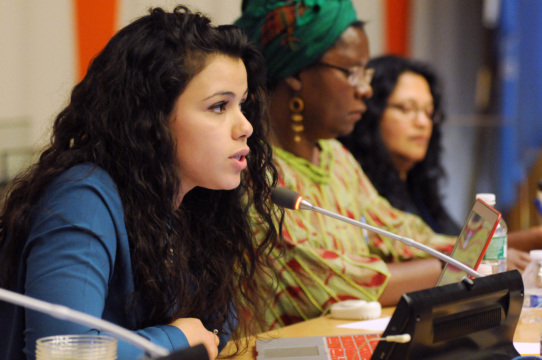What Roles are Women Playing in Mexico’s Drug War?
What roles are women playing in Mexico’s brutal drug trafficking war?
At the inaugural Cities Summit of the Americas in Denver, Colorado, the Inter-American Dialogue and CAF-Development Bank of Latin America convened mayors and other subnational policymakers, civil society leaders, multilateral representatives, and private sector stakeholders for a high-level workshop entitled, “Women’s Economic Empowerment & the Digital Transformation.” This moderated, roundtable-style workshop served as a catalyst for leaders and experts to confront barriers, compile best practices, and foster hemispheric collaboration on the critical issue of bridging the digital divide.
Rebecca Bill Chavez, president and CEO of the Inter-American Dialogue, introduced the workshop as a landmark event for the Dialogue’s new Cities Initiative, which the organization has linked with its initiative on women and girls. She emphasized that communities are looking toward mayors and subnational policymakers for solutions amidst growing national polarization, gridlock, and political inefficacy, particularly when it comes to social inclusion and economic empowerment for people from marginalized groups. Chavez cited that although more than 70 percent of new global economic value creation over the next 10 years will be generated from the digital transformation, women are being disproportionately excluded from the digital economy, necessitating the innovative solutions such as those generated from this workshop.
"Despite calls for an inclusive economic recovery, women across the hemisphere are being left behind, in large part due to limited access to the digital economy. Mayors and other local leaders have demonstrated that they are uniquely positioned to transform a structure of discrimination and exclusion into one that empowers women."
- Rebecca Bill Chavez, President and CEO, Inter-American Dialogue
Ambassador Nina Hachigian, the first US Special Representative for City and State Diplomacy, provided remarks at the event. She shared her reflections as a key organizer in partnership with the Inter-American Dialogue of the Mayors Summit, which took place on the margins of the IX Summit of the Americas in Los Angeles, which helped pave the way for the first-of-its-kind Cities Summit of the Americas. Hachigian highlighted the significance of the Cities Summit for policy and diplomacy in the Western Hemisphere, as well as the critical role of cities in creating opportunities for women.
Barbara Kotschwar, executive director of the Visa Economic Empowerment Institute and expert moderator for the panel, laid groundwork for the workshop by introducing the three most critical components of women’s digital inclusion: access, skills, and trust. For women to fully participate in the digital economy, they need access to the internet and a physical device, they need digital literacy and skills for not only navigating, but leveraging technology for economic gains, and they need to trust the platforms they are using. While Kotschwar said that women are less likely to participate in the digital transformation overall, she also underscored that women’s participation in the global digital economy is trending positively, and cities have a unique opportunity to augment this upward trajectory. Kotschwar asked participants to identify the primary barriers to women’s participation in the digital economy and to highlight their own unique and innovative approaches to overcoming them.
Lack of connectivity and access was repeatedly cited as a key barrier for getting women online throughout the hemisphere. Mayor Carolina Leitao from Peñalolén, Chile, emphasized the need for devices, stressing that connectivity alone was not enough, and the pandemic demonstrated that even a cell phone is not sufficient — access to a computer is essential for women’s full participation in the digital transformation. Digital capacity-building was also a recurrent theme amongst participants, and most of the subnational leaders, from all sectors, had some form of digital upskilling and training program they were implementing. These programs, often geared toward women entrepreneurs, train women in essential skills ranging from the basics of using the internet to digital entrepreneurship skills and social media marketing, all the way to complex coding and website development. Though gender-based violence was identified as a barrier for women’s participation in the digital economy, participants highlighted the importance of digital economic empowerment as an opportunity for women to escape situations of domestic violence. Women who have their own form of income or their own online bank account have more opportunity to leave dangerous situations.
The workshop emphasized the juxtaposition between the urban and rural experiences in Latin America surrounding digital inclusion. Rural vs. urban and small vs. large municipalities face distinct barriers in getting women online. For example, Mayor Carolina Cosse of Montevideo, Uruguay shared that her city does not encounter the same challenges as many others when it comes to connectivity and access; Montevideo has the one of the highest rates of broadband coverage in Latin America and a very advanced network of connectivity infrastructure. Women in Montevideo are generally already online; however, Cosse identified gaps in STEM education for girls, which is essential for women to make headway into fields traditionally dominated by men and to equip them as the digital leaders of tomorrow. In stark contrast, Talia Cabrera, vice prefect of Morona Santiago, Ecuador, a rural province with high levels of poverty, shared that her efforts to get women online have come with their own unique challenges. For example, she has worked with women who must walk two hours just to reach her for the opportunity to sell one pair of earrings on Facebook. She not only has the challenge of lack of connectivity and access to physical devices, but then also capacity-building.
Vice Mayor of Recife, Brazil, Isabella de Roldao, was quick to draw attention to the disproportionate burden of care placed on women as a primary barrier for their participation in the digital economy, an issue echoed by the majority of the event’s participants. Participants agreed that when women are given free time, they use that time to better the economic situation of themselves and their families. With a lightened care workload, women have more capacity to take advantage of opportunities in the digital economy. Recognizing this reality, Mayor Claudia López highlighted her creative efforts in Bogotá, Colombia to relieve women’s caregiving burden. She emphasized that by making even seemingly unrelated city services more efficient, such as public transportation, women receive essential benefits in time saved that can then be dedicated to digital capacity-building or entrepreneurship.
Miguel Porrúa, principal sector specialist in digital government at the Inter-American Development Bank, also remarked on the direct financial costs of being a caretaker, which often puts expensive technology purchases out of reach. He stressed the importance of subnational leaders, and multilateral organizations, investing in familial assistance programs. Receiving financial assistance and offsetting regular household costs can generate the disposable income necessary to purchase a device or internet access. Adiam Emery, deputy mayor of Seattle in the United States, emphasized that digital economic empowerment can also mean offering these essential services themselves online. Creating online platforms for city services such as housing assistance and childcare credits demonstrates institutional trust in technology, is more accessible for women who are already online, and can serve as a digital “on-ramp” for women who have not accessed the internet before.
One word was echoed by participants throughout the workshop: investment. Investment in connectivity infrastructure, investment in device access, investment in digital upskilling workshops, investment in STEM education, investment in resources for caregivers, and investment in women business owners were cited repeatedly. Investment is both a solution and a challenge in and of itself. Cities often lack resources or have strict budget ear-marking that doesn’t allow for heightened investment in certain initiatives. Public-private partnership, multilateral collaboration, and civil society programmatic efforts were referenced as key solutions to these barriers.
Diana Alarcon, chief advisor and foreign affairs coordinator of Mexico City, provided important context for the conversation, highlighting that the digital divide cannot be framed as solely a women’s issue, and that members of historically marginalized groups, such as afro-descendants and indigenous peoples, members of the LGBTQI+ community, youth, and single mothers face exclusion from the digital economy as well. She underscored that when women hold more than one of these marginalized identities, their challenges are more complex and require different solutions.
Linda Maguire, deputy regional director for Latin America and the Caribbean at the United Nations Development Program, emphasized that empowering one woman economically has a rippling effect, as women tend to hire other women, and women’s economic inclusion is projected to greatly augment overall growth for the hemisphere. Empowering women through the digital transformation is one of the most promising opportunities for local leaders, and María Mercedes Ortíz, mayor of Salcedo, Dominican Republic, affirmed the profound future impact of the political will galvanized around this issue as a result of the workshop. Ana Maria Baiardi, manager of gender, inclusion and diversity for CAF-Development Bank of Latin America, concluded the workshop by emphasizing that no challenge is experienced in isolation. By exchanging best practices and building networks to support each other in overcoming shared challenges, cities and subnational leaders are better equipped to respond to the unique challenges experienced by their residents in bridging the digital divide.
USA Mayors and Subnational Policymakers
LAC Mayors and Subnational Policymakers
Civil Society and Private Sector Representatives
Multilateral Institution and Foundation Representatives
Special Guest
Partner Representatives
What roles are women playing in Mexico’s brutal drug trafficking war?
What are the best practices for engaging citizens in the region through new technologies?
How are women faring in Latin America? Where has progress been made and how has that been achieved?
 Inter-American Dialogue
Inter-American Dialogue

